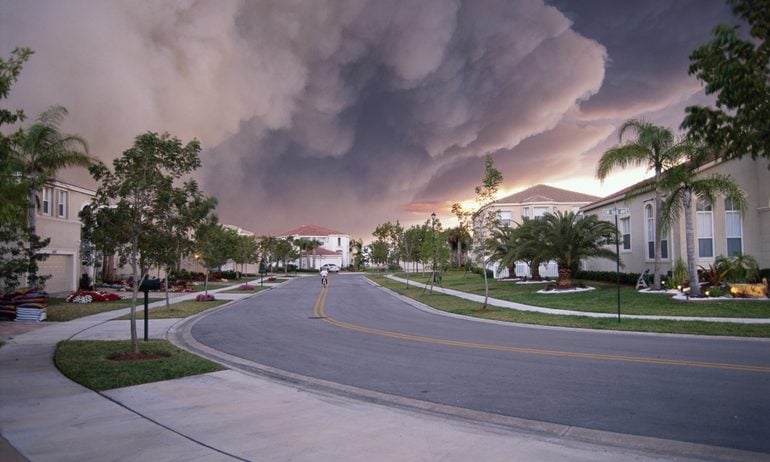What to Do if Your Home Insurer Drops You
If your home insurance company decides your home is too risky to insure, you still have options.

Many, or all, of the products featured on this page are from our advertising partners who compensate us when you take certain actions on our website or click to take an action on their website. However, this does not influence our evaluations. Our opinions are our own. Here is a list of our partners and here's how we make money.
Homeowners insurance non-renewals are on the rise as private insurers steer clear of locations at high risk for natural disasters. Blazing wildfires are leaving many homeowners scrambling to find coverage in Western states, while people in Florida and Louisiana are facing non-renewals during hurricane season.
Amid changing climate conditions and increasing weather-related catastrophes, having insurance coverage for your home can offer crucial peace of mind.
Here’s how to cope with a homeowners insurance non-renewal.
The difference between cancellation and non-renewal
Having your insurance policy canceled is not the same thing as non-renewal. Insurance companies generally can’t cancel a policy that is older than 60 days unless you don’t pay your bill, or they discover fraud or inaccuracies on your application.
Non-renewal is when you or the insurance company decides not to renew the policy when it expires. Insurers typically must give you at least 30 to 60 days’ notice if they decide not to renew your policy.
You might receive a non-renewal notice if:
You fail a home inspection.
Your insurer uses aerial images to view your home and sees something risky (such as roof damage).
You live in a high-risk area for wildfires, hurricanes or other natural disasters.
Your insurer no longer sells homeowners insurance in your area.
You committed fraud on your application.
How to get homeowners insurance after a non-renewal
If you receive a non-renewal notice, you still have options. Here are some steps you can take if your homeowners insurance isn’t renewed.
Make home improvements
If your policy isn’t renewed because of a failed inspection, making the proper updates could help you maintain coverage, even if you’re in a high-risk area.
Inspections give homeowners the opportunity to fix problems, like leaky roofs or exposed electrical wiring, so they can keep an insurance policy.
When making improvements, consider upgrading your home’s building materials. Newer materials may withstand weather catastrophes better than older ones while simultaneously lowering your insurance costs.
Building upgrades could include:
Replacing walls with ignition-resistant materials like stucco or fiber-cement siding to prevent fire damage.
Switching to impact-resistant shingles for a sturdier roof.
Installing hurricane-resistant windows if you live on the coast.
Shop around for another policy
Your previous insurer may not be an option, but you should still shop around.
An independent insurance agent can research home insurance quotes for companies in your area. You can also ask your real estate agent, mortgage lender, homebuilder or previous owner for a list of companies, or call your state’s insurance department.
Turn to your state’s shared market option
If you still can’t find coverage, you may need a state-run shared market policy. Many states offer Fair Access to Insurance Requirements policies for high-risk homes, or beach and windstorm plans for coastal properties. Aptly named “last-resort” policies, FAIR policies offer limited coverage and are often more expensive than a standard home policy from a private insurer.
Below are a few examples.
California’s FAIR Plan
The California FAIR Plan sells insurance for damage from fire, lightning, internal explosions and smoke, with optional coverage available for an extra charge.
These policies don’t cover everything standard homeowners insurance policies do, like personal liability, your belongings or additional living expenses. For more extensive coverage, homeowners in California should purchase a “difference in conditions” policy that complements FAIR Plan coverage.
Florida’s state-run insurer
Citizens Property Insurance is Florida’s insurer of last resort. It offers coverage similar to that of private insurers, including dwelling, personal property, other structures and additional living expense coverage, although limits may be lower. In some areas, the company also sells wind-only policies that cover damage from hurricanes and other wind-related catastrophes. Policies are available only through an independent agent.
Louisiana’s state-run insurer
Louisiana Citizens Property Insurance Corporation is the last-resort option for homeowners in Louisiana who can’t find coverage elsewhere. Its policies include the same types of coverage private insurers offer, so they’ll pay for things like lawsuits if your dog bites someone or a hotel stay if your home needs covered repairs. However, under state law, its policies must be more expensive than those of private insurance companies.
Consider surplus lines
If you’ve exhausted all other options, surplus lines insurance may be available. Provided by specialized insurers that are regulated differently from standard companies, surplus lines offer coverage for risky properties when other insurers won’t. Available companies may vary by state, so speak with an insurance agent about surplus lines once you’ve gotten rejections from at least three other insurers.





